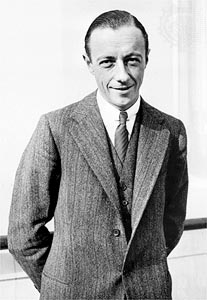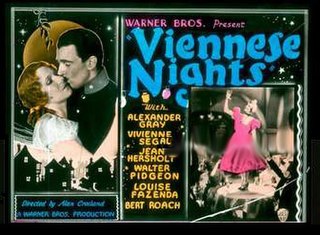
Otto Abels Harbach, born Otto Abels Hauerbach was an American lyricist and librettist of nearly 50 musical comedies and operettas. Harbach collaborated as lyricist or librettist with many of the leading Broadway composers of the early 20th century, including Jerome Kern, Louis Hirsch, Herbert Stothart, Vincent Youmans, George Gershwin, and Sigmund Romberg. Harbach believed that music, lyrics, and story should be closely connected, and, as Oscar Hammerstein II's mentor, he encouraged Hammerstein to write musicals in this manner. Harbach is considered one of the first great Broadway lyricists, and he helped raise the status of the lyricist in an age more concerned with music, spectacle, and stars. Some of his more famous lyrics are "Smoke Gets in Your Eyes", "Indian Love Call" and "Cuddle up a Little Closer, Lovey Mine".

This is a list of notable events in music that took place in the year 1928.
This is a list of notable events in music that took place in the year 1926.
This is a list of notable events in music that took place in the year 1924.

Rodgers and Hart were an American songwriting partnership between composer Richard Rodgers (1902–1979) and the lyricist Lorenz Hart (1895–1943). They worked together on 28 stage musicals and more than 500 songs from 1919 until Hart's death in 1943.

Rodgers and Hammerstein was a theatre-writing team of composer Richard Rodgers (1902–1979) and lyricist-dramatist Oscar Hammerstein II (1895–1960), who together created a series of innovative and influential American musicals. Their popular Broadway productions in the 1940s and 1950s initiated what is considered the "golden age" of musical theatre. Five of their Broadway shows, Oklahoma!, Carousel, South Pacific, The King and I and The Sound of Music, were outstanding successes, as was the television broadcast of Cinderella (1957). Of the other four shows that the team produced on Broadway during their lifetimes, Flower Drum Song was well-received, and none was an outright flop. Most of their shows have received frequent revivals around the world, both professional and amateur. Among the many accolades their shows garnered were thirty-four Tony Awards, fifteen Academy Awards, two Pulitzer Prizes and two Grammy Awards.

Gustav Gerson Kahn was an American lyricist who contributed a number of songs to the Great American Songbook, including "Pretty Baby", "Ain't We Got Fun?", "Carolina in the Morning", "Toot, Toot, Tootsie ", "My Buddy" "I'll See You in My Dreams", "It Had to Be You", "Yes Sir, That's My Baby", "Love Me or Leave Me", "Makin' Whoopee", "My Baby Just Cares for Me", "I'm Through with Love", "Dream a Little Dream of Me" and "You Stepped Out of a Dream".

Sigmund Romberg was a Hungarian-born American composer. He is best known for his musicals and operettas, particularly The Student Prince (1924), The Desert Song (1926) and The New Moon (1928).

Vincent Millie Youmans was an American Broadway composer and producer.
The New Moon is the name of an operetta with music by Sigmund Romberg and book and lyrics by Oscar Hammerstein II, Frank Mandel, and Laurence Schwab. The show was the third and last in a string of Broadway hits for Romberg written in the style of Viennese operetta. It spawned a number of revivals and two film versions, and it is still played by light opera companies. The piece turned out to be "Broadway's last hit operetta", as World War II and the Golden Age of musicals approached.
The Student Prince is an operetta in four acts with music by Sigmund Romberg and book and lyrics by Dorothy Donnelly. It is based on Wilhelm Meyer-Förster's play Old Heidelberg. The piece has elements of melodrama but lacks the swashbuckling style common to Romberg's other works. The plot is mostly faithful to its source.

Little Mary Sunshine is a musical that parodies old-fashioned operettas and musicals. The book, music, and lyrics are by Rick Besoyan. The original Off-Broadway production premiered November 18, 1959 at the Orpheum Theatre in New York City's East Village. Staying in the neighborhood, it moved to the Player's Theatre on June 21, 1961, then, finally, to the Cherry Lane Theatre on March 21, 1962. Closing was Sept. 2, 1962. Combined run was 1,143 performances. It was seen briefly in a West End production in 1962 and has become a popular show for amateur and semi-professional groups in the United States and elsewhere.

Deep in My Heart is a 1954 MGM biographical musical film about the life of operetta composer Sigmund Romberg, who wrote the music for The Student Prince, The Desert Song, and The New Moon, among others. Leonard Spigelgass adapted the film from Elliott Arnold's 1949 biography of the same name. Roger Edens produced, Stanley Donen directed and Eugene Loring choreographed. José Ferrer played Romberg, with support from soprano Helen Traubel as a fictional character and Merle Oberon as actress, playwright, librettist, producer, and director Dorothy Donnelly.

Viennese Nights is a 1930 American all-talking pre-code musical operetta film directed by Alan Crosland and starring Alexander Gray, Vivienne Segal, Walter Pidgeon, Jean Hersholt, Bela Lugosi and Louise Fazenda. It was photographed entirely in Technicolor and released by Warner Brothers. Viennese Nights was the first original operetta written especially for the screen by Oscar Hammerstein II and Sigmund Romberg. It was filmed in March and April 1930, before anyone realized the extent of the economic hardships that would arrive with the Great Depression, which had begun in the autumn of the previous year. Although not a box office hit in the United States, the film had long box office runs in Britain and Australia. It is one of the earliest sound films to have a short pre-credit sequence.

The Girl of the Golden West is a 1938 American musical Western film adapted from the 1905 play of the same name by David Belasco, better known for providing the plot of the opera La fanciulla del West by Giacomo Puccini. A frontier woman falls in love with an outlaw.
"Softly, as in a Morning Sunrise" is a song with music by Sigmund Romberg and Oscar Hammerstein II from the 1928 operetta The New Moon. One of the best-known numbers from the show, it is a song of bitterness and yearning for a lost love, sung in the show by Philippe (tenor), the best friend of the hero, Robert Mission (baritone).
New Moon is a 1930 black-and-white American, pre-Code romantic/drama/melodrama musical film version of the operetta The New Moon, with music by Sigmund Romberg and book and lyrics by Oscar Hammerstein II and others. The original stage version premiered on Broadway in 1928. The 1930 film is also known as Komissa Strogoff in Greece, Nymånen in Denmark and Passione cosacca in Italy. A second adaptation, also titled New Moon, was released in 1940.

Paul Hörbiger was an Austrian theatre and film actor.

Sonny Side Up is an album by saxophonist Sonny Stitt recorded in 1960 and originally released on the Roost label.
Nancy McCord was an American soprano and actress who had an active career in opera, musical theatre, and vaudeville during the 1920s, 1930s and early 1940s. She appeared in operettas and musicals on Broadway and in operas with several American companies, including the St. Louis Municipal Opera and the Metropolitan Opera. Her repertoire consisted mainly of roles from light opera and operettas. She is best remembered for creating the roles of Marie-Baroness von Schlewitz in the original production of Oscar Hammerstein II and Sigmund Romberg's May Wine (1935); and Mary Stone in the world premiere of Douglas Moore's The Devil and Daniel Webster (1939).













